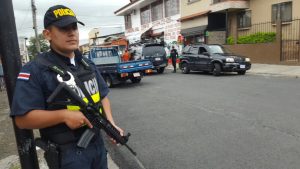How safe is Costa Rica – really? I get asked that question a lot and I mean an awful lot.
So, I thought I’d write a post providing my opinion on this important issue. In the future expect to get a link to this post if you ask me the question…
In Terms of Economic Security…
The general question of safety can be taken a couple different ways. The first one that I will address is economic security, i.e., is Costa Rica a safe place to invest your hard-earned dollars? I’d imagine most folks who ask are more concerned with the second part, which concerns physical and material security. But, nevertheless, I thought it pertinent to address the economic aspect as well.
Historically speaking, Costa Rica has been a relatively safe place to invest. Now, there are a lot of ways to do so poorly and many do make bad, or even stupid, investment decisions and lose their shirts in the process. This blog has many posts written to help you avoid those mistakes. But, generally speaking, Costa Rica has been a safe place for foreign investment over the years.
Could that be changing?
Well, Costa Rica is having a bit of a deficit crisis these days. And unlike the United States, Costa Rica doesn’t likely have the ability to quantitatively ease its way out of the mess. The new presidential administration of Carlos Alvarado is taking steps to correct the problem, but those actions are being met with widespread public resistance. We are now in the umpteenth week of a national strike against these austerity and tax measures aimed at tackling the deficit. It remains to be seen if the government can deal with this in a way that avoids major disruption.
As a result of all that, together with current strength in the U.S. dollar, the Costa Rica colon has reached an all-time high of around 610 colones to 1 greenback. That’s not so good for the average Costa Rican as inflation is ticking up as a result. But it can be good, at least in the short-term, for foreign investors buying Costa Rican colon denominated assets with dollars.
What’s my opinion? Well it’s mixed. Costa Rica needs to correct its fiscal deficit. If it doesn’t, it will put further pressure on the economy and that could ultimately be bad for anyone living here, foreign or local. However, right now Costa Rica remains a good and safe bet and with the record strength of the dollar against the colon, a relatively cheap one too.
OK, that’s enough with the boring economic stuff…what about…
In Terms of Physical and Material Security…
If you’re from the U.S. and have never been to Latin America before, you’ll probably be surprised to see that most homes, especially in urban areas, have walls around the periphery, sometimes adorned with razor wire, and iron bars on all the windows. I often get asked by alarmed gringos if that signifies a lack of safety.
Well, yes and no. Let’s start with the good news. In part it’s cultural and you’ll see that phenomenon not just in Costa Rica, but in just about any Latin American country, or at least all the ones I’ve been to. Nevertheless, it does have a practical aspect. First of all, Costa Rica is a poor country and most of its citizens live in a state of poverty that even the poorest in the U.S. couldn’t imagine, from a material standpoint at least. That level of poverty can lead to desperation, which can lead to property crime. Secondly, many older Latin Americans have experienced, first or second-hand, the specter of social upheaval, or even outright revolution. And if there’s a revolution erupting and an angry proletariat amassing in the public squares, having your home set up like a fortress does make a bit of good common sense.
Costa Rica is a gateway for drugs moving from South America to North America. It probably will be for the foreseeable future, or as long as the “drug war” continues unabated. That means that at any given time there are some very unsavory characters out there who wouldn’t think twice about using extreme physical violence to protect what they deem is their coveted piece of the drug trade pie. Now most Costa Ricans have nothing to do with this…by the way, same goes with most Colombians. But even so, the average peace-loving Costa Rican (or expat living among them) can get caught in the crossfire of rival drug cartels and gangs. That happens more often in the San Jose metropolitan areas and also in port towns, especially Limon. But it can happen anywhere to anyone.
Costa Rica has its own immigration issues. I’ve heard figures as high as 500,000 for the number of illegal immigrants living in Costa Rica, many from Nicaragua, as well as other countries. And as the strife increases in neighboring countries to the north and south, that trend will likely continue and grow. This can lead to problems with crime as some of those moving into Costa Rica are either criminals when they get here, or resort to crime for survival reasons. Oh my god, I sound like Donald Tump! Practically speaking, the uptick in crime in San Jose may indeed have a lot to do with this immigration influx. I don’t know that to be the case, but wouldn’t be surprised if it weren’t. Bottom line is that just like in any large metropolitan area in the U.S., or anywhere else, there are crime issues and you have to be wary of them.
There’s another aspect of physical and material security that most realtors won’t tell you about. And that concerns what I call “culture clash.” There are some areas of Costa Rica where foreign investors have moved in and sort of changed, or attempted to change, the cultural landscape. I am thinking chiefly of places like the Guanacaste “gold coast” and to a lesser extent the central Pacific around Jaco and even my own southern Pacific area known as the Costa Ballena.
For starters the coastal areas of Costa Rica, as beautiful as they are, tend to historically be some of the poorest areas of the country. Job opportunities are few and far between, infrastructure can be very spotty, and most in these coastal areas live off the land and sea. When you couple that with an influx of wealthy North Americans moving in and creating things that these folks can hardly afford, it tends to create resentment and that can lead to outright culture clash. This has lead to problems, mainly with property crime, but sometimes even with physical violence in the form of home invasions and other strong-arm robbery tactics.
The North Americans who invest in these areas learn quickly to take measures to avoid problems with security systems and even armed guards. I am not trying to paint an exaggeratedly negative picture, but I do want to be realistic and tell you the truth. Am I trying to say don’t invest in those areas? No, not at all. Just know the landscape and what you’re getting into and don’t be naive about the risk of encountering problems.
So, what’s my overall opinion on Costa Rica safety. How safe is Costa Rica – really?
It’s safer than virtually any other country in Latin America and I’d say the pros of investing and/or living here far outweigh the cons and that includes the safety (or lack thereof) con.

